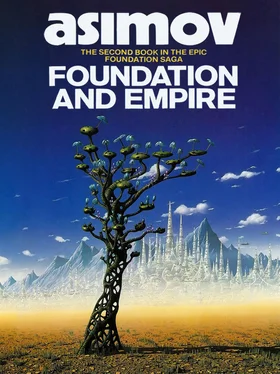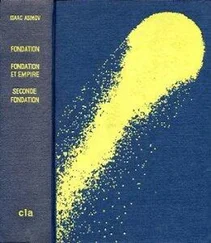“But the Foundation—”
“—Will take care of itself, as heretofore. Come, there’s the question of dinner. I’m hungry. And afterwards, the evening is ours and we may as well use it. We shall never see Trantor or any world like it again, you know.”
The Home Commissioner of the Outer Provinces spread his pudgy hands helplessly and peered at the petitioners with owlish nearsightedness. “But the Emperor is indisposed, gentlemen. It is really useless to take the matter to my superior. His Imperial Majesty has seen no one in a week.”
“He will see us,” said Barr, with an affectation of confidence. “It is but a question of seeing a member of the staff of the Privy Secretary.”
“Impossible,” said the commissioner emphatically. “It would be the worth of my job to attempt that. Now if you could but be more explicit concerning the nature of your business. I’m willing to help you, understand, but naturally I want something less vague, something I can present to my superior as reason for taking the matter further.”
“If my business were such that it could be told to any but the highest,” suggested Barr, smoothly, “it would scarcely be important enough to rate audience with His Imperial Majesty. I propose that you take a chance. I might remind you that if His Imperial Majesty attaches the importance to our business which we guarantee that he will, you will stand certain to receive the honors you will deserve for helping us now.”
“Yes, but—” and the commissioner shrugged, wordlessly.
“It’s a chance,” agreed Barr. “Naturally, a risk should have its compensation. It is a rather great favor to ask you, but we have already been greatly obliged with your kindness in offering us this opportunity to explain our problem. But if you would allow us to express our gratitude just slightly by—”
Devers scowled. He had heard this speech with its slight variations twenty times in the past month. It ended, as always, in a quick shift of the half-hidden bills. But the epilogue differed here. Usually the bills vanished immediately; here they remained in plain view, while slowly the commissioner counted them, inspecting them front and back as he did so.
There was a subtle change in his voice. “Backed by the Privy Secretary, hey? Good money!”
“To get back to the subject—” urged Barr.
“No, but wait,” interrupted the commissioner, “let us go back by easy stages. I really do wish to know what your business can be. This money, it is fresh and new, and you must have a good deal, for it strikes me that you have seen other officials before me. Come, now, what about it?”
Barr said, “I don’t see what you are driving at.”
“Why, see here, it might be proven that you are upon the planet illegally, since the Identification and Entry Cards of your silent friend are certainly inadequate. He is not a subject of the Emperor.”
“I deny that.”
“It doesn’t matter that you do,” said the commissioner, with sudden bluntness. “The official who signed his Cards for the sum of a hundred credits has confessed—under pressure—and we know more of you than you think.”
“If you are hinting, sir, that the sum we have asked you to accept is inadequate in view of the risks—”
The commissioner smiled. “On the contrary, it is more than adequate.” He tossed the bills aside. “To return to what I was saying, it is the Emperor himself who has become interested in your case. Is it not true, sirs, that you have recently been guests of General Riose? Is it not true that you have escaped from the midst of his army with, to put it mildly, astonishing ease? Is it not true that you possess a small fortune in bills backed by Lord Brodrig’s estates? In short, is it not true that you are a pair of spies and assassins sent here to— Well, you shall tell us yourself who paid you and for what!”
“Do you know,” said Barr, with silky anger, “I deny the right of a petty commissioner to accuse us of crimes. We will leave.”
“You will not leave.” The commissioner arose, and his eyes no longer seemed nearsighted. “You need answer no question now; that will be reserved for a later—and more forceful—time. Nor am I a commissioner; I am a Lieutenant of the Imperial Police. You are under arrest.”
There was a glitteringly efficient blast-gun in his fist as he smiled. “There are greater men than you under arrest this day. It is a hornet’s nest we are cleaning up.”
Devers snarled and reached slowly for his own gun. The lieutenant of police smiled more broadly and squeezed the contacts. The blasting line of force struck Devers’s chest in an accurate blaze of destruction—that bounced harmlessly off his personal shield in sparkling spicules of light.
Devers shot in turn, and the lieutenant’s head fell from an upper torso that had disappeared. It was still smiling as it lay in the jag of sunshine which entered through the new-made hole in the wall.
It was through the back entrance that they left.
Devers said huskily, “Quickly to the ship. They’ll have the alarm out in no time.” He cursed in a ferocious whisper. “It’s another plan that’s backfired. I could swear the space fiend himself is against me.”
It was in the open that they became aware of the jabbering crowds that surrounded the huge televisors. They had no time to wait; the disconnected roaring words that reached them, they disregarded. But Barr snatched a copy of the Imperial News before diving into the huge barn of the hangar, where the ship lifted hastily through a giant cavity burnt fiercely into the roof.
“Can you get away from them?” asked Barr.
Ten ships of the traffic-police wildly followed the runaway craft that had burst out of the lawful, radio-beamed Path of Leaving, and then broken every speed law in creation. Further behind still, sleek vessels of the Secret Service were lifting in pursuit of a carefully described ship manned by two thoroughly identified murderers.
“Watch me,” said Devers, and savagely shifted into hyperspace two thousand miles above the surface of Trantor. The shift, so near a planetary mass, meant unconsciousness for Barr and a fearful haze of pain for Devers, but light-years further, space above them was clear.
Devers’s somber pride in his ship burst to the surface. He said, “There’s not an Imperial ship that could follow me anywhere.”
And then, bitterly, “But there is nowhere left to run to for us, and we can’t fight their weight. What’s there to do? What can anyone do?”
Barr moved feebly on his cot. The effect of the hypershift had not yet worn off, and each of his muscles ached. He said, “No one has to do anything. It’s all over. Here!”
He passed the copy of the Imperial News that he still clutched, and the headlines were enough for the Trader.
“Recalled and arrested—Riose and Brodrig,” Devers muttered. He stared blankly at Barr. “Why?”
“The story doesn’t say, but what does it matter? The war with the Foundation is over, and at this moment, Siwenna is revolting. Read the story and see.” His voice was drifting off. “We’ll stop in some of the provinces and find out the later details. If you don’t mind, I’ll go to sleep now.”
And he did.
In grasshopper jumps of increasing magnitude, the trade ship was spanning the Galaxy in its return to the Foundation.
Lathan Devers felt definitely uncomfortable, and vaguely resentful. He had received his own decoration and withstood with mute stoicism the turgid oratory of the mayor which accompanied the slip of crimson ribbon. That had ended his share of the ceremonies, but, naturally, formality forced him to remain. And it was formality, chiefly—the type that couldn’t allow him to yawn noisily or to swing a foot comfortably onto a chair seat—that made him long to be in space, where he belonged.
Читать дальше












